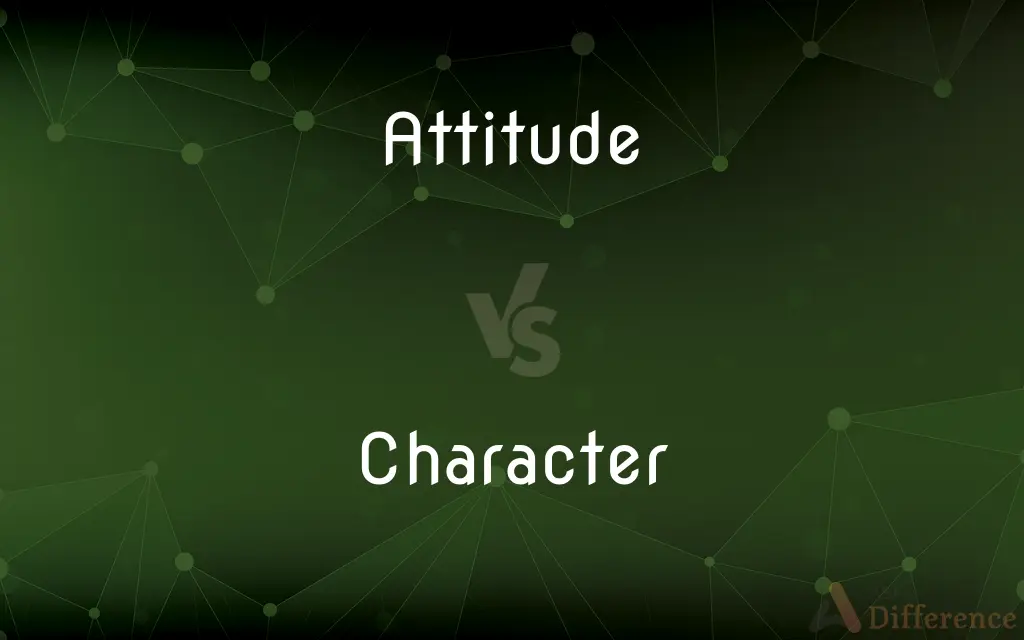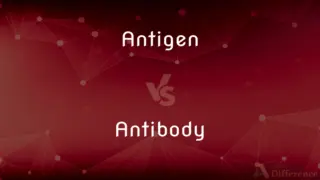Attitude vs. Character — What's the Difference?
By Urooj Arif & Fiza Rafique — Updated on March 20, 2024
Attitude reflects a person's immediate disposition or reaction towards situations or people, while character encompasses deeper, enduring qualities defining moral and ethical actions.

Difference Between Attitude and Character
Table of Contents
ADVERTISEMENT
Key Differences
Attitude represents an individual's mental and emotional outlook towards various aspects of life, manifesting through feelings, thoughts, and behaviors towards situations, objects, or people. Whereas, character is a set of traits and qualities that are ingrained in a person, shaping their behavior and actions consistently over time, regardless of changing circumstances.
Attitude is often visible through a person's reaction in specific situations and can fluctuate based on experiences, mood, or environment, showcasing a temporary state of mind. On the other hand, character is more stable and enduring, developing over a long period and being less susceptible to momentary influences.
While attitudes can be positive, negative, or neutral, influencing how one perceives the world and interacts within it, character encompasses a broader spectrum of moral and ethical values such as honesty, integrity, and kindness, fundamentally guiding one’s decisions and actions.
Attitude can be easily influenced and changed through experiences, persuasion, and education, reflecting a person's adaptability to their surroundings. Character, however, is deeply rooted in an individual's beliefs and values, requiring significant personal effort and time to alter.
Attitudes are often evaluated in social contexts, affecting interpersonal relationships and communication. In contrast, character is assessed over time, through consistent actions and decisions, forming the basis of trust and reputation in both personal and professional spheres.
ADVERTISEMENT
Comparison Chart
Definition
A person's outlook or disposition towards something.
The ethical and moral traits of a person.
Changeability
Can change quickly with new experiences.
Develops over time; more stable.
Visibility
Often immediately observable.
Revealed through consistent actions over time.
Basis
Emotional and mental state.
Moral and ethical values.
Influence
Influenced by external factors and can be modified.
Deeply ingrained and harder to change.
Compare with Definitions
Attitude
The way one views something or tends to behave towards it, often reflected in their language.
His attitude towards the project was skeptical at best.
Character
The mental and moral qualities distinctive to an individual.
His integrity is a crucial aspect of his character.
Attitude
A predisposition to respond favorably or unfavorably to a situation.
Her positive attitude towards work contributes to a good office environment.
Character
The reputation of a person or thing as being good or bad in a moral or ethical sense.
He is known for his good character and professionalism.
Attitude
A complex mental state involving beliefs and feelings.
Her attitude has changed significantly since she started meditating.
Character
A person in a novel, play, or movie.
The character of the hero in the story evolves dramatically.
Attitude
The orientation of an object relative to a frame of reference.
The plane's attitude was adjusted for a smoother landing.
Character
A description of a person's attributes, traits, or abilities.
Patience is not just a virtue but a defining element of her character.
Attitude
An expression of favor or disfavor towards a person, place, thing, or event.
The crowd's attitude during the concert was electric.
Character
The stable set of attributes and features that distinguish one person from another.
Her character is marked by honesty and loyalty.
Attitude
A settled way of thinking or feeling about something
He was questioned on his attitude to South Africa
Being competitive is an attitude of mind
Character
The combination of mental characteristics and behavior that distinguishes a person or group.
Attitude
Truculent or uncooperative behaviour
I asked the waiter for a clean fork and all I got was attitude
Character
The distinguishing nature of something.
Attitude
The orientation of an aircraft or spacecraft, relative to the direction of travel.
Character
Moral strength; integrity
An educational program designed to develop character.
Attitude
A manner of thinking, feeling, or behaving that reflects a state of mind or disposition
Has a positive attitude about work.
Kept a dignified attitude throughout the crisis.
Character
Public estimation of someone; reputation
Personal attacks that damaged her character.
Attitude
Arrogant or aggressive disposition or behavior
One customer with a lot of attitude really tried my patience.
Character
(Biology) A structure, function, or attribute of an organism, influenced by genetic, environmental, and developmental factors.
Attitude
A position of the body or manner of carrying oneself
Stood in a graceful attitude.
Character
A person considered as having a specific quality or attribute
"Being a man of the world and a public character, [he] took everything as a matter of course" (George Eliot).
Attitude
A position similar to an arabesque in which a ballet dancer stands on one leg with the other raised either in front or in back and bent at the knee.
Character
A person considered funny or eccentric
Catcalls from some character in the back row.
Attitude
The orientation of an aircraft's axes relative to a reference line or plane, such as the horizon.
Character
A person portrayed in an artistic piece, such as a drama or novel.
Attitude
The orientation of a spacecraft relative to its direction of motion.
Character
A person or animal portrayed with a personality in comics or animation
A cartoon character.
Attitude
The position of the body or way of carrying oneself.
The ballet dancer walked with a graceful attitude.
Character
Characterization in fiction or drama
A script that is weak in plot but strong in character.
Attitude
(figurative) Disposition or state of mind.
Don't give me your negative attitude.
You've got a nice attitude today.
Character
Status or role; capacity
In his character as the father.
Attitude
Unpleasant behavior.
He doesn't take attitude from anybody.
I asked the waiter for a clean fork and all I got was attitude.
Character
A description of a person's attributes, traits, or abilities.
Attitude
The orientation of a vehicle or other object relative to the horizon, direction of motion, other objects, etc.
The airliner had to land with a nose-up attitude after the incident.
Character
A formal written statement as to competency and dependability, given by an employer to a former employee; a recommendation.
Attitude
(ballet) A position similar to arabesque, but with the raised leg bent at the knee.
Character
A mark or symbol used in a writing system.
Attitude
To assume or to place in a particular position or orientation; to pose.
Character
A Chinese character.
Attitude
To express an attitude through one's posture, bearing, tone of voice, etc.
Character
One of a set of symbols, such as letters or numbers, that are arranged to express information.
Attitude
The posture, action, or disposition of a figure or a statue.
Character
The numerical code representing such a character.
Attitude
The posture or position of a person or an animal, or the manner in which the parts of his body are disposed; position assumed or studied to serve a purpose; as, a threatening attitude; an attitude of entreaty.
Character
(Mathematics) The trace function of a representation.
Attitude
Fig.: Position as indicating action, feeling, or mood; as, in times of trouble let a nation preserve a firm attitude; one's mental attitude in respect to religion.
The attitude of the country was rapidly changing.
'T is business of a painter in his choice of attitudes (posituræ) to foresee the effect and harmony of the lights and shadows.
Never to keep the body in the same posture half an hour at a time.
Character
A style of printing or writing
"Here is the hand and seal of the Duke.
You know the character" (Shakespeare).
Attitude
A complex mental state involving beliefs and feelings and values and dispositions to act in certain ways;
He had the attitude that work was fun
Character
A cipher or code for secret writing.
Attitude
Position or arrangement of the body and its limbs;
He assumed an attitude of surrender
Character
Of or relating to one's character.
Attitude
A theatrical pose created for effect;
The actor struck just the right attitude
Character
Specializing in the interpretation of often minor roles that emphasize fixed personality traits or specific physical characteristics
A character actor.
Attitude
Position of aircraft or spacecraft relative to a frame of reference (the horizon or direction of motion)
Character
Of or relating to the interpretation of such roles by an actor
The character part of the hero's devoted mother.
Character
Dedicated to the portrayal of a person with regard to distinguishing psychological or physical features
A character sketch.
Character
To write, print, engrave, or inscribe.
Character
To portray or describe; characterize.
Character
(countable) A being involved in the action of a story.
Character
(countable) A distinguishing feature; characteristic; trait; phene.
A single locus governing the petal colour character was detected on the linkage group A2.
Character
A complex of traits marking a person, group, breed, or type.
A study of the suspect's character and his cast iron alibi ruled him out.
Character
(uncountable) Strength of mind; resolution; independence; individuality; moral strength.
He has a great deal of character.
"You may not like to eat liver," said Calvin's father, "but it builds character."
Character
(countable) A unique or extraordinary individual; a person characterized by peculiar or notable traits, especially charisma.
Julius Caesar is a great historical character.
That bloke is such a character.
Character
(countable) A written or printed symbol, or letter.
Character
Style of writing or printing; handwriting; the particular form of letters used by a person or people.
An inscription in the Runic character
Character
A secret cipher; a way of writing in code.
Character
One of the basic elements making up a text file or string: a code representing a printing character or a control character.
Character
A person or individual, especially one who is unknown.
We saw a shady character slinking out of the office with some papers.
That old guy is a real character.
Character
A complex number representing an element of a finite Abelian group.
Character
(countable) Quality, position, rank, or capacity; quality or conduct with respect to a certain office or duty.
In the miserable character of a slave
In his character as a magistrate
Character
The estimate, individual or general, put upon a person or thing; reputation.
A man's character for truth and veracity
Her actions give her a bad character.
Character
A reference given to a servant, attesting to their behaviour, competence, etc.
Character
Personal appearance.
Character
(obsolete) To write (using characters); to describe.
Character
A distinctive mark; a letter, figure, or symbol.
It were much to be wished that there were throughout the world but one sort of character for each letter to express it to the eye.
Character
Style of writing or printing; handwriting; the peculiar form of letters used by a particular person or people; as, an inscription in the Runic character.
You know the character to be your brother's?
Character
The peculiar quality, or the sum of qualities, by which a person or a thing is distinguished from others; the stamp impressed by nature, education, or habit; that which a person or thing really is; nature; disposition.
The character or that dominion.
Know well each Ancient's proper character;His fable, subject, scope in every page;Religion, Country, genius of his Age.
A man of . . . thoroughly subservient character.
Character
Strength of mind; resolution; independence; individuality; as, he has a great deal of character.
Character
Moral quality; the principles and motives that control the life; as, a man of character; his character saves him from suspicion.
Character
Quality, position, rank, or capacity; quality or conduct with respect to a certain office or duty; as, in the miserable character of a slave; in his character as a magistrate; her character as a daughter.
Character
The estimate, individual or general, put upon a person or thing; reputation; as, a man's character for truth and veracity; to give one a bad character.
This subterraneous passage is much mended since Seneca gave so bad a character of it.
Character
A written statement as to behavior, competency, etc., given to a servant.
Character
A unique or extraordinary individuality; a person characterized by peculiar or notable traits; a person who illustrates certain phases of character; as, Randolph was a character; Cæsar is a great historical character.
Character
One of the persons of a drama or novel.
Character
To engrave; to inscribe.
These trees shall be my books.And in their barks my thoughts I 'll character.
Character
To distinguish by particular marks or traits; to describe; to characterize.
Character
An imaginary person represented in a work of fiction (play or film or story);
She is the main character in the novel
Character
A characteristic property that defines the apparent individual nature of something;
Each town has a quality all its own
The radical character of our demands
Character
The inherent complex of attributes that determine a persons moral and ethical actions and reactions;
Education has for its object the formation of character
Character
An actor's portrayal of someone in a play;
She played the part of Desdemona
Character
A person of a specified kind (usually with many eccentricities);
A real character
A strange character
A friendly eccentric
The capable type
A mental case
Character
Good repute;
He is a man of character
Character
A formal recommendation by a former employer to a potential future employer describing the person's qualifications and dependability;
Requests for character references are all to often answered evasively
Character
A written symbol that is used to represent speech;
The Greek alphabet has 24 characters
Character
Engrave or inscribe characters on
Common Curiosities
Can a person's character change?
Yes, character can evolve with deliberate efforts, experiences, and personal reflection, although it is generally more stable than attitude.
Is attitude more important than character?
Both are important; attitude affects immediate perceptions and interactions, while character shapes long-term relationships and personal integrity.
What is the difference between attitude and character?
Attitude is about one's feelings or views towards people, objects, or situations, while character encompasses the deep-seated qualities that dictate a person’s moral and ethical actions.
Can attitude influence character?
Yes, sustained changes in attitude can influence character development over time, especially if new attitudes lead to consistent behaviors.
What role does attitude play in success?
A positive attitude can lead to better coping strategies, resilience, and openness to opportunities, contributing to success.
How does character affect one's life?
Character influences decisions, relationships, and how one is perceived by others, significantly impacting personal and professional opportunities.
How are attitude and character related?
Attitude can reflect aspects of one’s character, and over time, consistent attitudes can become part of one’s character.
Can attitude be measured?
Attitude can be assessed through surveys, observations, and psychological tests, although its subjective nature makes it challenging to measure precisely.
How can one improve their attitude?
Through self-reflection, exposure to new perspectives, and adopting a growth mindset, one can develop a more positive attitude.
Can external events change a person's character?
Significant life events can impact character, especially if they lead to profound personal growth or change in values.
What indicates a strong character?
Consistency in ethical and moral behavior, resilience in adversity, and integrity in various situations indicate a strong character.
Why is character important in leadership?
Strong character builds trust, inspires others, and establishes a leader’s credibility and integrity.
Does culture affect character and attitude?
Yes, cultural norms and values can significantly influence both character and attitude development.
Is it easier to change one's attitude or character?
It is generally easier to change one's attitude, as character is more deeply ingrained and involves core values and ethics.
How do attitude and character influence relationships?
Attitude affects daily interactions and communication, while character determines deeper trust and compatibility in relationships.
Share Your Discovery

Previous Comparison
Antigen vs. Antibody
Next Comparison
Port vs. HarborAuthor Spotlight
Written by
Urooj ArifUrooj is a skilled content writer at Ask Difference, known for her exceptional ability to simplify complex topics into engaging and informative content. With a passion for research and a flair for clear, concise writing, she consistently delivers articles that resonate with our diverse audience.
Co-written by
Fiza RafiqueFiza Rafique is a skilled content writer at AskDifference.com, where she meticulously refines and enhances written pieces. Drawing from her vast editorial expertise, Fiza ensures clarity, accuracy, and precision in every article. Passionate about language, she continually seeks to elevate the quality of content for readers worldwide.















































